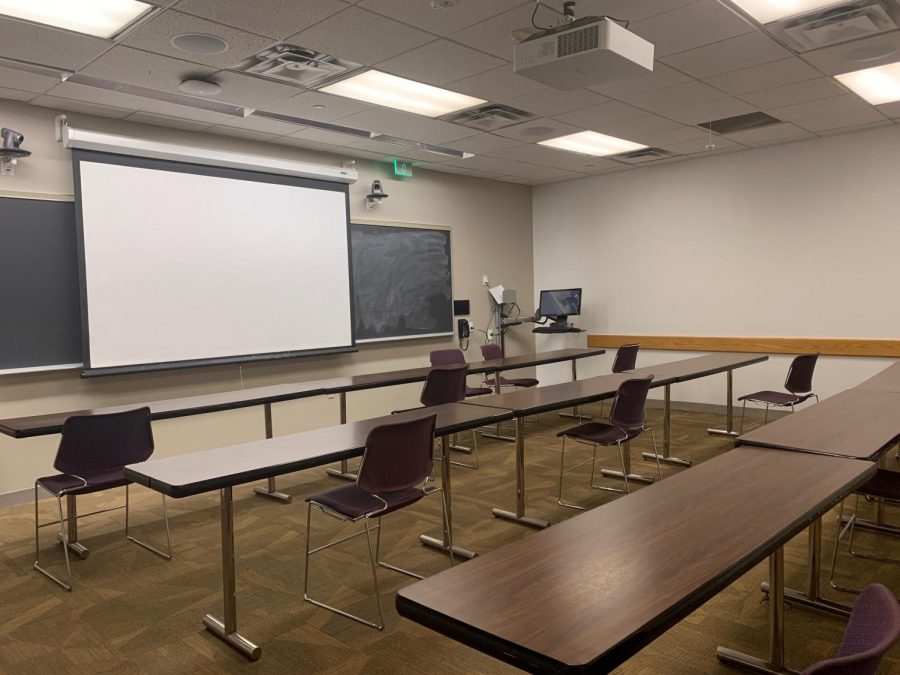Op-ed: An open letter to Northeastern students, from one of your professors
A concerned professor sheds light on Northeastern’s expectations for the spring semester.
October 29, 2020
Editor’s note: The News has confirmed the identity of this professor, who has elected to remain anonymous for fear of professional retaliation.
Dear students,
I am writing to ask for your help, since your words and actions will be more powerful than mine. I want to tell you why Northeastern University’s new “return to campus” policy for spring 2021 is unsafe, discriminatory and out of line with our community’s values of “protect the pack.” As such, it demands immediate pushback from students as well as faculty.
As of Oct. 22, the provost told faculty that we will no longer have the option to request remote teaching for the spring 2021 semester unless we document a specific medical condition from the Centers for Disease Control and Prevention’s list. The university will no longer consider age, childcare or non-CDC health vulnerabilities to be valid reasons to request remote work.
The burden of this new policy will disproportionately fall on women and faculty of color. The emerging research on this is crystal clear. People of color face higher rates of infection and death from COVID-19. An entire generation of young professional women with children are expected to experience permanent, devastating setbacks in their professional trajectories. For example, working women are disproportionately more likely to quit their jobs because of lack of childcare. A policy like this will drastically worsen Northeastern’s existing challenges in the area of diversity, equity and inclusion.
This policy is in direct conflict with the president’s recent commitment to foster a more diverse and inclusive Northeastern. It is an appalling step in light of the larger struggles for justice and equity happening in the world around us. To be concrete: if you want to see more female faculty and faculty of color in the future at Northeastern, you should stand up to this policy. It will make success less attainable for those of us who are already Northeastern faculty and will deter others from applying to teach here in the future.
Let me explain why. First, this policy is unsafe for faculty, our families and you. While past research reveals some risk factors for severe COVID-19, such as cancer, diabetes and heart disease, many people without these risk factors have been severely ill or have died from COVID-19. There is currently little conclusive research on how less common health vulnerabilities like autoimmune disorders impact the severity of COVID-19, so these conditions do not make the CDC list — not because they are not high risk, but because we simply do not have enough evidence yet. We do not yet know what the long-term damage of COVID-19 will be on, for example, the lungs of our children.
Despite these uncertainties, the university is proposing to force more of us onto campus, including many of the community’s most vulnerable members, just as infection rates in Boston are rising. COVID-19 is still a deadly, unpredictable disease that appears to have debilitating long-term health effects, even for those who are otherwise young and healthy. And we know that mortality rates have been especially high among Black communities and other communities of color.
We all have pandemic fatigue, which makes it tempting to downgrade our perceptions of the threat and “return to normal.” But people are still dying at appalling rates, and the infection and mortality rates are currently climbing. Faculty members teaching remotely are not doing so because we prefer it. Please believe me when I say on behalf of the faculty that we miss you and the classroom terribly. The thing keeping us out of the classroom is research suggesting that it is not yet safe for many of us to return, whether it be for our own safety or the health of our family members.
A number of us are also teaching remotely because of the childcare crisis that is unfolding throughout the country. Boston Public Schools have just gone entirely remote — again. Daycares will close as case counts rise in the winter months. It is almost impossible to hire a nanny or babysitter now, and the few who are available are unaffordable or have no childcare skills or experience.
Given this situation, under Northeastern’s new policy, we face many ultimatums. We could abandon our children at home without care or supervision, bring them to class with us at the expense of the quality of my teaching, hire someone who has no idea how to safely care for our children, take a leave of absence or quit our jobs. We don’t want to leave Northeastern, but we cannot put our children in unsafe situations.
The new university policy thus places an outrageous burden on parents of young children, who are disproportionately untenured and thus especially vulnerable because our jobs are less secure than our senior colleagues. We are afraid to raise our voices and say that this policy will have grave consequences for us financially, professionally and in terms of the basic well-being and safety of our families. To reiterate: if this policy stands, women, and particularly women of color, will suffer most.
On Oct. 27, Provost David Madigan sent a follow-up email saying that if faculty expect to experience “genuine and significant hardship” for teaching in person, we should individually contact our department chair and provide a written explanation of our hardship, “which will be forwarded to my office to be reviewed.” However, this still fails to address the core problem outlined in this letter, as no official indication has been provided to faculty of what “hardships” will be accommodated.
In an Oct. 28 interview with The Boston Globe, university spokesperson Renata Nyul indicated that faculty with childcare issues may be able to use the hardship route, but the university has provided no clarity around specific circumstances that would constitute “genuine and significant hardship.” Moreover, the need to provide our children with care and the need to protect our health in the face of uncertain evidence are structural needs, not individual “hardships.” Worse, this creates a new set of vulnerabilities: to make this “hardship” request, I would have to submit details about my personal and family situation and health vulnerabilities to the provost, the very person who ultimately has veto power over my reappointment. There is no way to guarantee that making this request will not have repercussions for my career’s future.
The administration is telling us that you — our students — “need us back in the classroom.” Indeed, they are naming student demand as the sole reason for this change in policy, but administrators are not pointing to indicators of low student learning. They are telling us that our students “want” us to return. Yet, my own students have reported feeling grateful for the work I’m putting in to making our online classes effective. They are satisfied with the quality of my teaching, sympathetic towards my childcare situation and shocked when they learn that this new policy is being pushed in their names. Your voices are being represented as the justification for this dangerous and discriminatory policy without any evidence that this is what you are actually asking for.
My guess is that many of you would be uncomfortable knowing your professors are being forced back to the classroom to teach in conditions many of us deem unsafe, discriminatory and in many cases, pedagogically inferior. We need the kind of flexibility we had in the fall to deliver our best teaching and avoid untenable situations for women and faculty of color, who are already underrepresented at Northeastern.
So, I am asking you to speak out and push back. Share this letter with your friends. Start petitions. Ask your parents to call Northeastern and tell them that you don’t want your professors to be frightened, sick, forced to take leaves of absences or give up their careers if they have children. We love being your teachers, and we are fiercely committed to delivering top quality education to you in this unprecedented time. Please help us get the support and flexibility we need to do our jobs.
You can reach the Provost David Madigan at d.madigan@northeastern.edu or 617-373-4517. Your parents can contact the Office of Family Programs at parents@northeastern.edu or 617-373-3868.
I am grateful for your consideration and solidarity.
See you in class,
A junior professor who is also a mother
P.S. I am not a member of Northeastern’s staff, so I cannot represent their views, but they certainly face parallel struggles in light of this spring 2021 policy and have very little institutional power to advocate for themselves. Please include them in your advocacy.







